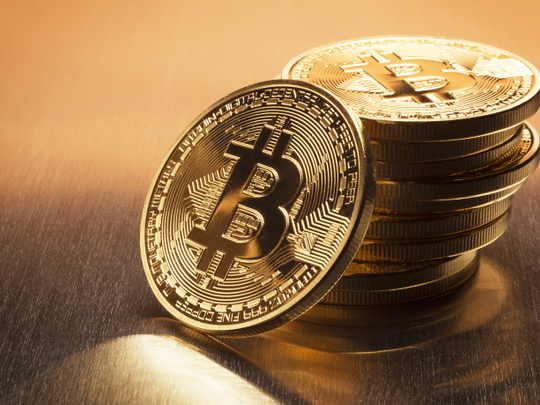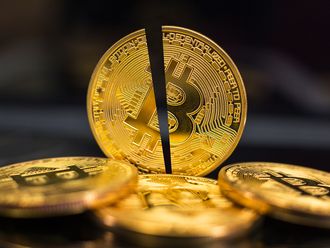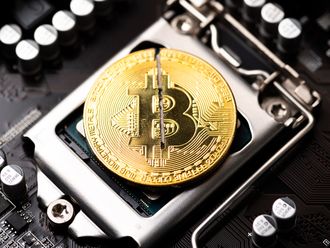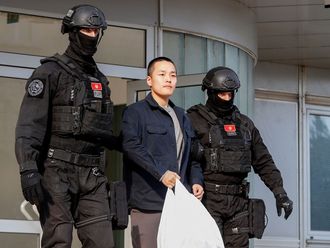
Dubai: Some investors in the region are putting their money where their mouth is.
Despite all the warnings from central banks, with a few traditional fund managers calling it a ‘bubble’ or even a ‘fraud’, investors in the region are testing waters by allocating their money to benefit from spectacular returns in massively volatile Bitcoin prices, which gained by more than 19 times last year, and other cryptocurrencies.
A 42-year old engineer, Girish Aidsani, an Indian expat in Dubai, who was running a loss on local share holdings claims that he recovered his money by trading in Cardano, a cryptocurrency, in 15 days.
Aidsani, who also trades in Indian stocks, was put off by the lack of movement in shares that he held. “I was incurring a huge loss on Shuaa, which I bought at Dh1.70. But I recovered that money in 15 days by trading in Cardano. The best part in cryptocurrencies is volatility, that is a heaven for day traders,” Aidsani told Gulf News.
Cardano has gained from $0.02 in October last year to hit a peak of Dh1.25, compared to more than 5 per cent gains in gold, which is also a part of Aidsani’s investment universe, during the same time period, .
And there are other ways to make money.
Despite the monetary restrictions imposed by local exchanges, traders are resorting to exchange of cryptocurrencies within themselves due to monetary transfer restrictions imposed by exchanges. This is generally done due to maximise returns in highly volatile cryptocurrencies.
For example, Dubai-based cryptocurrency exchange BitOasis has a limit of Dh50,000 per week for old customers, and Dh20,000 for newly registered clients.
New clients
And there are thousands of investors joining by each passing day.
BitOasis said in mid-December that “thousands and thousands” of new people in the region are buying their first bitcoin and ethereum on on a daily basis.
Khurram Shroff, the Chairman of International Blockchain Capital (IBC) said there are 500,000 new investors in cryptocurrencies each month.
“Most of the money coming into cryptocurrencies we believe is being diverted from other asset classes. So as part of a diversified portfolio, traders are looking at the potential returns cryptocurrencies might give them,” Konstantinos Anthis, Senior Associate — Research at ADS Securities in Abu Dhabi told Gulf News.
Fomo impact
Analysts say the rally in Bitcoins and other cryptocurrencies is fuelled by later entrants in the market.
“FOMO, or ‘fear of missing out,’ is driving most of retail investors’ interest in Bitcoin and other cryptocurrencies — as the media buzz heightens, they want to get in on the price appreciation, fuelling a feedback loop,” Alberto Perucchini, Next Generation research analyst at Julius Baer said.
Mom and pop investors are putting their money into Bitcoin and other cryptocurrencies as they seek to cash in on the stellar gains registered last year. But so far in January, Bitcoin has been trading in a range, with a strong support at $10,000, and the cryptocurrency sees a bounce back everytime it falls below that keenly-watched level.
Anthis likens the situation of money coming into Bitcoins like the one seen during the dot.com crash.
“There is a herd mentality with people investing in the coins in the same way that they piled into tech stocks ahead of the dot.com crash,” Anthis said, adding “We would just counsel investors to be careful. Ahead of the tech crash, many people thought they had made their fortunes.”
KYC norms
Locally, BitOasis disabled withdrawals and deposits from customers of Emirates NBD citing that the bank “randomly returning or blocking our customers’ transfers and withdrawals due to an internal policy within the bank that is out of our control.”
Emirates NBD said they don’t prohibit clients from Bitcoin trading, but “have policies, systems and controls to detect and prevent financial crime including money laundering, terrorist financing and breaches of international sanctions.”
Shroff from ICB Group said: “Bearers of such money have managed to seek ways to rinse through several avenues and industries… and the authorities have always managed to regulate and block their access. That certainly does not mean that a certain industry poses a systemic threat.”
Aidsani said he was better off trading in cryptos. “My mantra is to make the hay when the sun shines. Even if you don’t want to trade, then hold for dear life,” Aidsani said.












